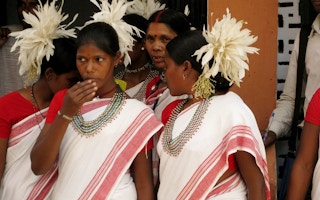Millions of migrants and tribal people in India’s northeastern Assam state could be denied land because of a new definition of the term “indigenous”, land and human rights experts said.
Assam has a long-simmering movement against immigrants and its 2019 land policy, aimed at overhauling a three-decade old land law, seeks to allocate land to landless indigenous people - but does not specify who is indigenous.
“After we bring the law, an indigenous person can sell his or her land to an indigenous person only, not to anyone else. That means our land will be preserved for our people,” health minister Himanta Biswa Sarma told reporters at a briefing.
The new land law comes as nearly 1.9 million residents, mostly Muslim, were left off a citizens register in Assam last year, as part of a drive to detect and detain illegal immigrants.
Protests erupted across India in December against a new citizenship law, with demonstrators in Assam fearing it would convert thousands of illegal migrants from neighbouring Muslim-majority Bangladesh into legal residents.
“
In a country where birth certificates, marriage certificates and death certificates are not common, how do you produce these records for yourself, let alone your parents?
Walter Fernandes, senior fellow, North Eastern Social Research Centre
Prime Minister Narendra Modi’s ruling Bharatiya Janata Party (BJP), which also governs Assam, says there are hundreds of thousands of illegal immigrants in Assam from Bangladesh.
To be included on the citizenship register, people had to furnish proof of residence in India going back decades, before March 24, 1971, the year in which hundreds of thousands of people fled Bangladesh, as it split from Pakistan.
Minister Sarma said a committee will define the term “indigenous”, and consider various cut-off dates for arrival in the state to determine who belonged there and was entitled to receive land from the government.
Any definition would run counter to India’s classification of indigenous people, which is applied to its 104 million tribal population - also known as Adivasis or “original inhabitants” - who make up nearly 10 per cent of the country’s 1.3 billion citizens.
Nationally, indigenous people are entitled to special rights and protections, including over land and resources.
Assam’s new land policy is to set to further marginalise millions of poor tribal people and ethnic minorities, said Walter Fernandes, a senior fellow at the North Eastern Social Research Centre, a think-tank in Guwahati city in Assam.
“In a country where birth certificates, marriage certificates and death certificates are not common, how do you produce these records for yourself, let alone your parents?” he told the Thomson Reuters Foundation.
The land policy, with its restrictive definition of indigenous people that applies cut-off dates and requires supporting documentation, will mark a “paradigm shift” in Assam, said Aman Wadud, a human rights lawyer
“It is a very discriminatory policy, as Bengali Muslims and Hindus will not be regarded as indigenous,” said Wadud, who represents several residents left off the citizenship list.
“Even those who have lived here for a long time will not be regarded as indigenous, including women who generally have few documents to prove residence.”
Yet resentment against migrants, seen as taking away jobs and land, is growing and may spark more policies across India that limit land ownership to select groups, Fernandes said.
This story was published with permission from Thomson Reuters Foundation, the charitable arm of Thomson Reuters, that covers humanitarian news, climate change, resilience, women’s rights, trafficking and property rights. Visit http://news.trust.org/climate.








